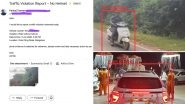Washington, Dec 15 (AFP) The US-China trade deal is "remarkable" in scope but it won't solve all the problems between the world's two biggest economies, the top US negotiator said Sunday.
"This is not just about agriculture and other purchases," US Trade Representative Robert Lighthizer said in an interview with CBS's "Face the Nation." "The way to think about this deal, is this is a first step in trying to integrate two very different systems to the benefit of both of us," he said.
The so-called phase one agreement announced Friday includes elements dealing with intellectual property protections, technology, currency and financial services.
Above all, Lighthizer said, "it's enforceable." He said the USD 50 billion in additional purchases of American agricultural products by China is spelled out in writing in the agreement.
Though the agreement is still being translated and has yet to be signed, Lighthizer insisted, "This is totally done." He would not give a precise date for the signing but said he expected it to happen in early January.
China committed to a minimum of USD 200 billion in increased purchases over the next two years from US manufacturers, farmers, energy producers and providers of services over the next two years, according to Lighthizer.
US exports to China will double in the next year, and nearly triple the year after if the agreement is in place.
In 2017, before the US-China trade war was unleashed, the United States exported some USD 120 billion in goods to the Asian giant.
"Over the course of the last year, what this president has accomplished in this area is remarkable," Lighthizer said, referring also to the just concluded US-Mexico-Canada trade deal and others.
"Any one of these deals would have been monstrous. And the fact that we have all of them together is great for agriculture," he said.
The deal, however, has met with a mixed reaction from trade experts, in part because some details have yet to be released.
China expert Scott Kennedy said that the costs of the trade war "have been substantial and far reaching (and) the benefits narrow and ephemeral." And trade economist Mary Lovely said the gains in the deal do not fully compensate for the damage to US farmers and businesses.
But Lighthizer said negotiators never envisioned solving all trade issues at one go, and future negotiations with China will be informed by the implementation of the phase one agreement.
"It really is a remarkable agreement, but it's not going to solve all the problems," he said.
The agreement does enable the two sides to declare a truce in a trade war that has roiled the global economy for the past 18 months.
Since March 2018, Beijing and Washington have inflicted punitive reciprocal tariffs on hundreds of billions of dollars of goods, hitting the Chinese economy hard and slowing global economic growth.
In exchange for the Chinese commitments, the Trump administration called off a new round of tariffs that was set to go into effect on Sunday.
And under the terms of the agreement, it agreed to reduce by half the tariffs imposed September 1 on USD 120 billion in Chinese goods. (AFP)
(The above story is verified and authored by Press Trust of India (PTI) staff. PTI, India’s premier news agency, employs more than 400 journalists and 500 stringers to cover almost every district and small town in India.. The views appearing in the above post do not reflect the opinions of LatestLY)













 Quickly
Quickly


